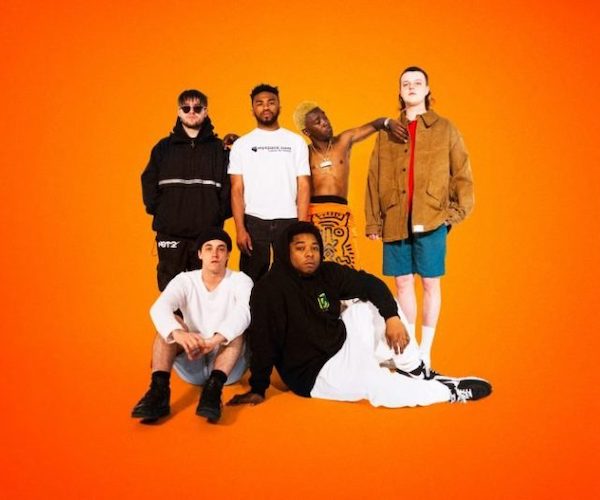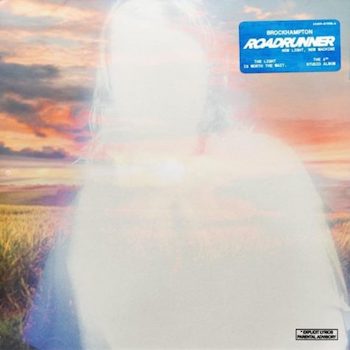Rap Album Review: “Roadrunner: New Light, New Machine” — The Art of Musical Diversity
By Alex Szeptycki
Roadrunner: New Light, New Machine is Brockhampton’s tightest album to date.

Performing members of Brockhampton at the top, from left to right: Bearface, Kevin Abstract, Merlyn Wood, Joba. Bottom: Matt Champion and Dom McLennon.
It’s hard to pin down Brockhampton’s kaleidoscopic musical vision. This diverse group of artists and its rotating cast of collaborators make up America’s favorite boy band (a self-applied moniker). In the past, the group’s work has been defined by a raucous dynamic, a joyously controlled chaos. These are artists who thrive on their combined versatility; individuals serve the creativity of the group. This allows for ideas to rush out, going in countless different directions. With remarkable ease, their records flit between purist hip hop, pop earworms, and harrowing confessionals. The group’s new album, entitled Roadrunner: New Light, New Machine, embraces this easy eclecticism: this is Brockhampton’s tightest album to date.
Brockhampton’s approach centers around the collective. In “Windows,” the recording’s most concerted group effort, every performing member contributes a verse. Each artist mixes his own style into the track: Merlyn Wood’s high energy rapping is buoyed by background chants of “go Merlyn, go Merlyn,” which adds a jammy vibe to his performance. Dom McLennon, in contrast, delivers a much smoother cadence, shifting the song’s mood: “My pen could be a fortune teller or an ATM/Its got intentions of its own I can’t even pretend,” Dom’s lyricism revels in linguistic complexity, which meshes well with the rap’s flow. Much of Roadrunner is driven by this strategic group dynamic: each member stamps the tracks with his distinctive artistic identity.
Still, the group’s togetherness is not always celebratory. Their vision can take a sharp political turn. For example, “Don’t Shoot Up the Party,” a track that uses party rap aesthetics to critique American racism and gun culture. “All American self hatred runs deep/White boys all I see whenever I sleep” vehemently spits (a cappella) Kevin Abstract, before the arrival of squealing synths and aggressive drums, underscoring the chorus chants of “please don’t shoot up the party.” There’s fear and anger in their voices here, an attempt to reflect the horror of the country’s frequent mass shootings. Joba’s matter-of-fact declarations of “Why you gotta grab that Pistol?/Think about who’s gon’ miss you” end the song on a chilling note.
Throughout Roadrunner, the group consistently displays their aptitude for hip-hop songwriting. On the high energy “Buzzcut,” the intro track, the group raps over bouncing kicks and intermittent drones, emphasizing the track’s fast paced, off-kilter rhythms. It’s capped off by a Danny Brown guest verse that amplifies what was a brash, slightly combative opening. “Chain on,” the following track, retains the earlier braggadocio, but shifts it over to a smooth yet swaggering boom bap beat: the mix is dominated by hypnotic key hits and deft bass notes. On this tune, Brockhampton is joined by Baltimore rapper JPEGMafia. That rapper’s usual aggressive flow is toned down here, a reserve that compliments the instrumental. These guest verses are perfectly placed and staged — the interludes make the songs better, but Brockhampton’s own members are never out-shined.
As the album progresses, Brockhampton’s pop sensibilities become increasingly evident. The hooks on Roadrunner are some of the catchiest the group has come up with to date. On “Count on Me,” ethereal synths cascade over guest A$AP Rocky’s opening verse, which drips with relationship angst. That anxiety is offset by an ironically delicate, airy refrain, “It’ll be ok, no matter what they say about us/I know that it’ll be ok.” Harmonies float over the beat. The drama and melody mesh into a gorgeous track.
Because of its contrasting talents and sensibilities, Brockhampton can easily embrace vastly different styles. “Bankroll” sees the group pairing with New York hip hop collective A$AP Mob via a woozy, drug-laced trap beat. The nocturnal vibes fluidly transition into “The Light,” a caustic, guitar-driven confessional. “When I look into my eyes I see a broken man,” fires off Joba. He is trying to process the trauma of his father’s suicide, an event that he’ll return to frequently on the album. Later, the group slides back into a pop-focused mindset with the aughts R&B-inspired “I’ll Take You On.” Roadrunner switches between its disparate styles fluidly, flitting between its various identities with ease.

As the album develops, the tracks begin to serve up harrowing bursts of vulnerability. The members of Brockhampton have never been shy about addressing their own emotional crises. “What’s the Occasion?” opens with a somber refrain from Joba: “A million little pieces/all add up to nothing lately.” Screeching guitars arrive to break up the peaceful atmosphere. Later, in “When I Ball,” Dom McLennon and Matt Champion trade heartfelt and dark verses about their respective childhoods. Dom’s verse deals with incarcerated family members; Matt raps about dangerous antics: “Pullin’ up at the doc in a Mazda 626/Bet my dad was trippin’ bad, hit the gas like a car chase.”
The album’s closing moments dramatize intense moments of catharsis for Brockhampton. The penultimate track, “Dear Lord,” is a gospel track that features a solo performance from Bearface. It’s a bare track, consisting of autotune harmonies, snaps, and modest piano keys. “Lord will you come down and help my brother?” sings Bearface, his layered voice cutting through the empty mix. This cry for help is the calm before the storm of “The Light PT. II,” an intense finale that deals with personal reckoning. “The light is worth the wait/I promise, wait/Why did you do it?” asks Joba in a ragged voice, directly confronting his father’s death. When Kevin Abstract takes the mic, he addresses his own feelings about family, sexuality, and race: “These days no license/Only take the Jeep if my boyfriend is drivin’/Plus he got the kinda skin that make the police like him.”
“Who let the dope boys out?/Thank god you let me crash on your couch.” Abstract’s couplet opens Roadrunner and it perfectly encapsulates the sense of camaraderie that drives this album forward. It’s a nod to the band member’s commitment to each other: after all, this is a group that met on a web forum and shared a house in Corpus Christi for most of their time together. This album is about the value of diversity — of sound and sensibilities. And how, when Brockhampton’s members come together, their traumas can be healed through music.
Alex Szeptycki is a writer from Charlottesville, VA. He recently graduated from Stanford University, majoring in American Studies with a focus in contemporary art and pop culture. He’s currently working as a freelance writer at the Arts Fuse while navigating post-grad life in a pandemic.

[…] Rap Album Review: “Roadrunner: New Light, New Machine” – The Art of Musical Divers… artsfuse.org “machine vision” – Google News […]